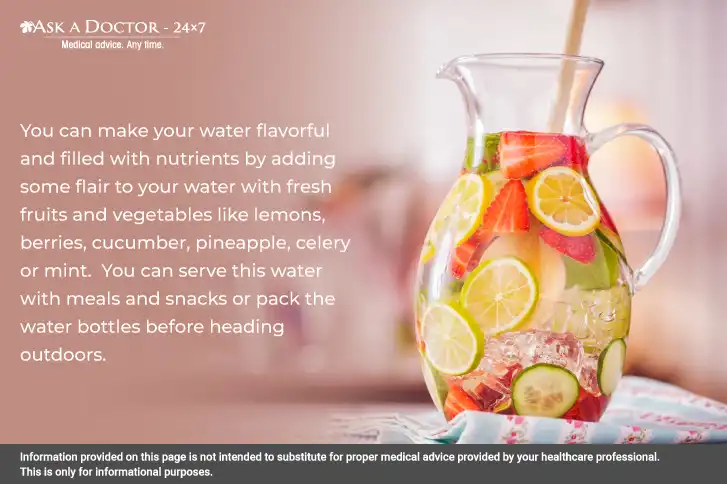How Much Water One Should Consume Daily: Age And Health-wise
While drinking less water can lead to dehydration, drinking too much fluid is also harmful, as your kidneys cannot eliminate excess water. This causes your blood's salt content to drop, and can be fatal. In this blog, we will understand how much water you should drink, and here are some tips to help you ensure you are drinking enough fluids to maintain good levels of hydration. Let us read through in detail...
What are the Benefits of Water?

The Centers for Disease Control and Prevention (CDC) lists that your body needs more water in hot climates, more physically active, and when you have a fever, diarrhea, or vomiting. Getting enough water every day is crucial for maintaining good health. Let’s look into the benefits of drinking water:
- Maintaining electrolyte balance
- Carrying nutrients and oxygen to your cells
- Maintaining a typical body temperature range
- Aiding digestion and preventing constipation regarding your spine and protecting sensitive tissues
- Lubricating and cushioning your joints
- Assisting in the removal of waste through perspiration, bowel movements, and urination
- Prevents dehydration, overheating, and the formation of kidney stones
Hence, make water your preferred beverage to avoid dehydration and ensure your body gets the fluids it requires. Drinking a glass of water is a smart idea:
- If you're feeling thirsty
- Between meals and with every meal
- Before, during, and following physical activity
What is the Ideal Daily Water Requirement, Age, and Health Wise?
You're likely getting enough fluids if:
- You don't often feel thirsty.
- You have colorless or pale yellow urine.
A person's water requirements might vary depending on several factors, including weight, lifestyle, and amount of exercise.
Age-Specific Water Intake Recommendations As Per the Institute of Medicine (IOM)
The average water consumption for individuals of various ages includes:
- Infants (0-6 months): In infants, experts advise that human milk or formula should be their main source of calories and moisture. Infants should avoid giving newborns plain water before they are six months old. Infants over six months can drink small amounts of water from a bottle if they require extra liquids on hot days.
- Infants (6 to 12 months): Children older than 6 months should be encouraged to drink water regularly. Regular bowel motions, kidney stones, and urinary tract infections (UTIs) can all be avoided with water. A one-year-old should have a diet consisting primarily of water, simple milk, and milk substitutes. They need around 0.8 to 1 liter of fluids per day, including breast milk or formula, and some water.
- Toddlers (1-3 years): They need around 1.3 liters of fluids per day, including water, milk, and other beverages.
- Children (4-8 years): They need around 1.7 liters of fluids per day, including water and other beverages.
- Children (9-13 years): Boys need around 2.4 liters, while girls need 2.1 liters of fluids per day, including water and other beverages.
- Adolescents (14-18 years): Boys need around 3.3 liters, while girls need 2.2 liters of fluids per day, including water and other beverages.
- Adults: Experts recommend that men should consume about 3.7 litres (130 ounces) of water per day, while women should consume 2.7 litres (95 oz).
Lifestyle-based Ways To Increase Water Intake
- Active Lifestyle: People with an active lifestyle perspire more and hence lose more water. Staying well-hydrated is crucial to maintaining your peak performance. Reduced body function can occur from even a two percent decrease in your level of hydration. Drink more water if you're active to stay hydrated and perform at your best.
- Location Where You Live: Those who live in warm climates need to drink more water to replace the body water drained during sweating. However, living in cold climates can also present hydration challenges, as you may naturally drink less water because you don’t feel thirsty. So, the rule is to keep drinking water regularly to ensure proper hydration.
- Pregnant or breastfeeding: Pregnant women or nursing mothers may require a higher water intake. Although there isn't a set amount of water that pregnant or nursing women should consume, you should think about increasing your daily water intake by at least two eight-ounce cups. Also, they should consult with their doctors regarding their water consumption.
- During disease or any kind of illness: If we are feeling ill, we tend to lose fluids more quickly than when we are feeling well. Additionally, a fever can cause the body to lose water more quickly. Drinking lots of water will help you heal, restore your strength, and generally feel better.
Ways to Include Water in Your Diet
One of the popular trends to increase your water intake and improve overall well-being is detox water, a natural remedy to help cleanse the body, improve digestion, and promote healthy skin. Check out these easy detox water recipes in your lifestyle:
1) Lemon and cucumber water
Ingredients:
- 1 litre of filtered water
- 1 lemon (sliced)
- 1 cucumber (sliced)
- Fresh mint leaves
Instructions: Add all the ingredients to a pitcher or jar. Let it sit in the fridge for at least 2 hours (or overnight for maximum flavor). Pour yourself a glass and enjoy!
2) Apple and cinnamon water
Ingredients:
- 1 litre of filtered water
- 1 lemon (sliced)
- 1 apple (sliced)
- Fresh mint leaves
Instructions: Add all the ingredients to a pitcher or jar. Let it sit in the fridge for at least 2 hours (or overnight for maximum flavor). Pour yourself a glass and enjoy!
3) Chia and mint water
Ingredients:
- 1 tbsp of chia seeds
- 1 litre of filtered water
- 1 lemon (sliced)
- Fresh mint leaves
- 1 tbsp Honey (optional)
Instructions: Add all the ingredients to a pitcher or jar. Let it sit in the fridge for at least 2 hours (or overnight for maximum flavor). Chia seeds swell and a gel-like consistency will be prepared by the end of the process. Pour yourself a glass and enjoy!
4) Ginger and lemon water
Ingredients:
- 1 litre of filtered water
- 1 lemon (sliced)
- 1 ginger (sliced)
- Ground turmeric
- Black pepper (to increase the bioavailability of turmeric)
Instructions: Add all the ingredients to a pitcher or jar. Let it sit in the fridge for at least 2 hours (or overnight for maximum flavor). Pour yourself a glass and enjoy!
5) Pineapple and mint water
Ingredients
- 1 cup of pineapple chunks
- Fresh mint leaves
- 1 litre of filtered water
Instructions:
- Put pineapple chunks and mint leaves in a pitcher or infuser.
- Fill with water and allow it to infuse in the fridge for 2-3 hours.
- Serve the drink chilled.
Conclusion
Drinking too little or too much water both have risks. Your body is constantly using and losing fluids through actions like sweating and urinating. If your body loses more fluids than it takes in, it can lead to dehydration. Contrary, if you drink too much, the extra water can dilute the electrolytes in your blood, causing water intoxication. Staying hydrated goes beyond just the water you drink. Try eating lots of fruits and vegetables that are high in water content. If you have any concerns about dehydration or a heat-related illness, don't hesitate to call your healthcare provider.
If you have any questions related to how much water you should consume in your daily regime, you can Ask a Dietitian at Ask a Doctor, 24x7.
Recently Answered Questions Related to Hydration
- How Much Water Should One Drink Per Day?
- How Much Water Should Be Consumed After Drinking Coffee?
- How Can Diarrhea And Nausea Be Treated While On Antibiotics For Cellulitis
- Is Frequent Urination Normal After Increased Water Consumption?
- How Much Decolic Syrup Is Safe For A Toddler To Consume?
- How Much Liver Enzymes Might Elevate After One Night Drinking?
- Child On Formula Food And Teething Phase And Sips Of ORS. How Much Water Should Be Given?
Disclaimer: Information provided on this page is not intended to substitute for proper medical advice provided by your healthcare professional. This is only for informational purposes.
Ask a Specialist
Recent Questions


